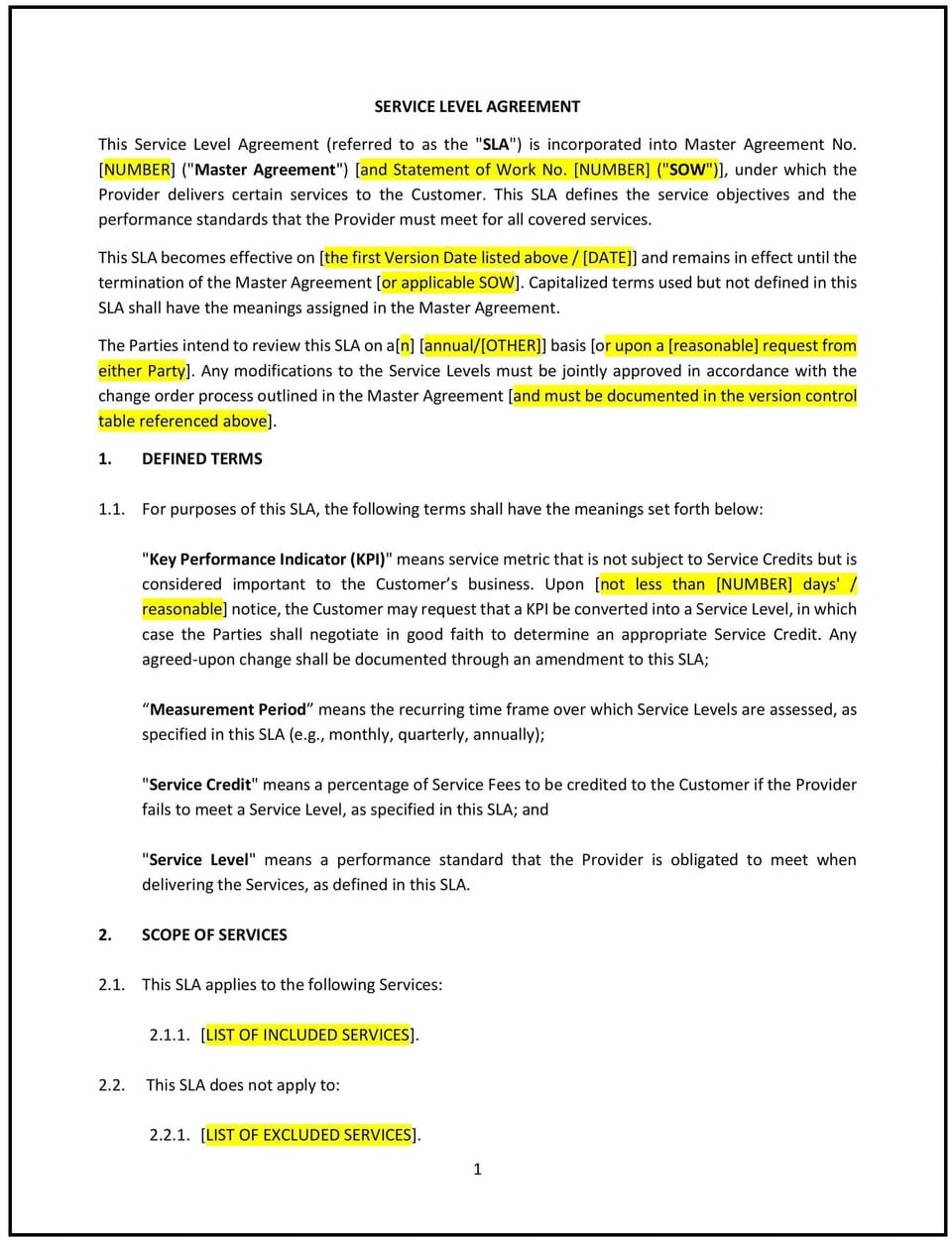Service Level Agreement (SLA) (Oregon): Free template

Service Level Agreement (SLA) (Oregon)
A Service Level Agreement (SLA) in Oregon is a legally binding contract that defines the standards, performance metrics, and responsibilities between a service provider and a client. This agreement ensures that both parties have clear expectations regarding service quality, response times, and remedies in the event of non-compliance. SLAs are commonly used in IT services, cloud computing, consulting, managed services, and maintenance agreements to ensure reliability and accountability.
Oregon enforces SLAs under general contract law, with additional requirements for businesses operating in regulated industries such as healthcare, financial services, and telecommunications. While the state does not impose specific SLA regulations, companies handling consumer data or sensitive information must comply with federal privacy laws. A well-structured SLA helps businesses minimize disputes, improve service reliability, and set enforceable expectations for service providers.
Tips for drafting and maintaining a Service Level Agreement in Oregon
- Provide a detailed description of the services covered, including performance expectations, service exclusions, and limitations to avoid misunderstandings.
- Establish measurable performance metrics such as uptime guarantees, response times, and resolution deadlines to track compliance and accountability.
- Clearly outline client responsibilities, such as providing system access, required resources, or cooperation necessary for service fulfillment.
- Define penalties, service credits, or contract termination rights if service levels are not met. Oregon contract law allows businesses to negotiate these remedies freely.
- Include a dispute resolution process, specifying whether conflicts will be resolved through Oregon courts, arbitration, or mediation. Arbitration is often preferred for efficiency and cost control.
- Address confidentiality and data security measures, particularly for providers handling sensitive business or customer data. Federal regulations such as HIPAA may apply to specific industries.
- Review and update the SLA regularly to reflect changes in business needs, regulatory requirements, or advancements in technology.
Frequently asked questions (FAQs)
Q: What should Oregon businesses include in a Service Level Agreement?
A: The agreement should define the scope of services, performance standards, remedies for service failures, client responsibilities, dispute resolution procedures, and termination rights.
Q: How does an SLA help businesses in Oregon?
A: It ensures service providers meet expectations, reduces disputes, improves accountability, and provides a structured approach to handling service failures.
Q: Are service credits enforceable in Oregon SLAs?
A: Yes, as long as they are clearly defined in the contract, service credits (such as fee reductions for unmet service levels) are legally enforceable.
Q: What happens if a service provider does not meet SLA requirements in Oregon?
A: Depending on the agreement, the client may be entitled to service credits, refunds, or contract termination. Legal action may be taken in cases of severe breaches.
Q: How should Oregon businesses handle SLA-related disputes?
A: The SLA should specify a resolution process, including mediation, arbitration, or litigation in Oregon courts, to ensure conflicts are handled efficiently.
Q: Are verbal SLAs enforceable in Oregon?
A: While verbal agreements may sometimes be legally binding, a written SLA provides stronger legal protection and ensures both parties understand their obligations.
Q: Can an SLA be modified after signing in Oregon?
A: Yes, but both parties must agree to modifications, and any changes should be documented in writing to prevent misunderstandings.
This article contains general legal information and does not contain legal advice. Cobrief is not a law firm or a substitute for an attorney or law firm. The law is complex and changes often. For legal advice, please ask a lawyer.


